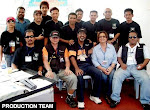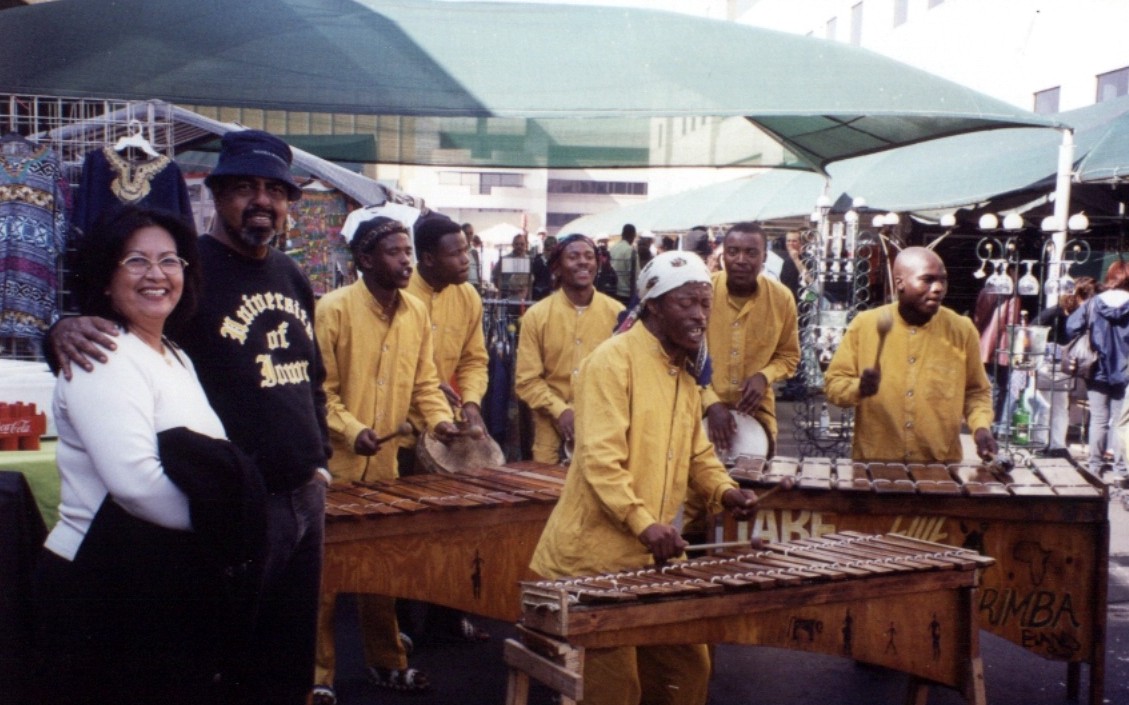 |
| By Joe Chelliah D.N.S., A.N.S., P.J.K. |
The writer Joe
Chelliah is a musician cum educator since 1960 and is an events consultant
since 1993. His vast experience includes
managing an assortment of corporate events from annual dinners and company
outings to family carnivals and launch
for clients such as Motorola, Texas Instruments, Petronas, UEM Group, PLUS,
MRCB, Perodua, Westport, Northport, FELDA and MIDA.
Managing The Suppliers
Thus a sound working knowledge of the latest artistes and AV equipment available in the country is essential to be a good event manager. This usually comes from experience and a constant updating of the latest trends, artistes and AV logistics available.
A Family Carnival in Stadium Settings
 Managing
artistes at a show is an event management skill – even with clowns
Managing
artistes at a show is an event management skill – even with clowns
***********************
An event can be any
social happening can be and have become part and parcel of our cultural landscape that
involve the government, corporate or community sectors. However, event
management still remains an unregulated “business. Events cover a wide
array of purposes including entertainment,
education, sports, life style events, religion, seminars, marketing ,
branding and what not..
The
very term “management” implies overcoming significant problems and managing
them. So, event management is also problem
management in reality. There are literally thousands of
self-proclaimed event managers and because there is no official regulating body
anyone can be an event manager. This in
itself is a problem. The construction
industry in contrast is regulated by various bodies including the CIDB and
contractors are graded from A to F.
It
is my contention that event management is about handling any problem that
arises in an event from planning and conceptualizing to the final delivery. I must also state unequivocally that managing
an event and organizing an event organizer are totally different sides of the
same coin. This distinction must be
understood clearly. The event organizer is the one who is hosting and paying
for the event while the event manager is the professional who is paid to manage
the event. The management of problems in
most events generally revolves around:
a)
The client
b) The suppliers
c) The entertainers
d) The budget
e) Quality Control
b) The suppliers
c) The entertainers
d) The budget
e) Quality Control
Client
expectations are usually very high and this makes them also very anxious of the
outcome of the event. I call this
“client trauma”. A good event manger
must manage this trauma from the design stage itself with much tact and
diplomacy. The client may have had bad experiences with a previous event which might
have been badly managed. Allaying the client’s fears and worries by
highlighting the event manager’s track record with visuals and videos does
help. This strategy is better than giving
references like in the old days.
Clients’ expectations can even be unreasonable
at times given the poor budget allocation.
Thus the lowering of a client’s
expectations and then exceeding it in the final delivery helps establish the
event mangers credibility in the long run. Most clients are often taken in by
smooth sales talk. It is better to remind and warn the client of Murphy’s Law
in advance ….that is “anything that can go wrong will go wrong” and more so in
the use of electronic equipment. The
client can be reassured that the equipment being used is well maintained and
fairly new.
Some
clients indeed try to manage or part-manage the event by unnecessarily by
procuring certain items or artistes themselves thinking it is cheaper. This is
not necessarily true. They can also keep
breathing down the event manager’s back like a “mandore” and this too can be a hindrance
to the event manager’s team. Artistes or
suppliers contracted directly will usually only listen to the client and may not
follow the instructions of the event manager.
It is always best to have one event manger who sees the forest as
a whole and not merely the trees or branches as would a supplier or an artiste. Too many cooks can spoil the soup.
Managing The Suppliers
There
is such a thing called a supplier mentality, trust me. The supplier’s main
interest is to supply what he has been contracted for. Of course that does not mean he is not
bothered about the event but his view is only of his “tree or branch” and not
the “forest”. These days some suppliers have also become event managers and
some are actually doing well. Suppliers
tend to impress the client by the fact that they own all the things being
supplied. Suppliers are also only interested
to rent equipment from their own stable even if such logistics may not be always
be suitable for the event. Event
managers on the other hand will think for the client and procure only the most
suitable and the latest stuff available in the market for the event.
Many
clients seldom know that suppliers have two sets of rates for their logistic
rentals – one for event managers and one for clients they are not the same. It
is just like any retail and wholesale business.
The client always gets the higher
price tag while a significant discount is given to the event manager to “cari
makan”. Just as there are A to Z
category event managers, suppliers too can be categorized along similar lines. Good
event mangers can differentiate them
Thus a sound working knowledge of the latest artistes and AV equipment available in the country is essential to be a good event manager. This usually comes from experience and a constant updating of the latest trends, artistes and AV logistics available.
A Family Carnival in Stadium Settings
Managing The Entertainers
Entertainers
are usually the main attraction and crowd pullers. This aspect can go wrong for a host of reasons such as mismatching of an artiste with
the audience, insensitive handling of
the artistes and poor stage production.
Most artistes are easy to handle if you exercise a bit of psychology and
have a little common sense.
Remember
never to scold any performer in private or in public for anything even if they
are as guilty as a fox with a chicken in its mouth. They can be very sensitive and it is unwise
to reprimand them for anything including such things as arriving just five
minutes before the show without any rehearsal or sound check. They can just walk away. So it is of utmost importance to understand
this and “tolerate” their idiosyncrasies, if any. This happens more often with certain artistes
who are convinced that they are superstars and deserve special treatment. Event managers know how to handle such
difficult but usually very popular artistes.
All
artistes appreciate prompt payment and preferably in cash. The 50% deposit must be paid in advance
besides making all transport, accommodation, sound system and F & B
requirements for the artiste and entourage. The balance must be paid immediately after the
show preferably in cash too. If the
artiste is paid in full even before the show after the sound check you assured
of a good show from the artiste.
There
are cases where artistes had been paid nothing else other than the 50%
deposit. The event manager goes missing after
the show is over or refuses to take calls from the artiste concerned for the
balance payment. Generally, artistes
know who the really professional event managers are and are happy to work with
such managers. In any case, they will still perform for anyone who calls but pays
them according to their terms or a no show situation can arise. And finally, like suppliers, artistes too
quote higher prices directly to clients when contacted but have a lower rate
for event managers. And yes, there are
still some artistes who come with an unessarily large entourage comprising of not only legitimate make-up artistes or
technicians but also boy/girl friends, children or friends or relatives.

The Budget
This of
course is the main problem often precipitated by the supply and demand
factor. Event managers are a dime a
dozen today as are artistes. Knowing this, a client may tend to squeeze the
event manager particularly if the procurement department folks of the bigger
multi-national companies come into the picture.
Such people treat the entertainment people in the same way the procure
pipes and nails for their companies from vendors. In the 1990’s a medium budget annual dinner
could cost anything above RM 50,000.
These days the budget for a similar event can be as low as RM 15,000 and
the clients still ask for the “wow” factor with such a budget. Given the growing number of event managers to
choose from this situation is not likely to go away.
Managing the Quality Control (QC) in Events
To manage
and to QC well, an event manager has to
know what quality is in the first place and therefore have proper experience
and a sound working knowledge. Any
microphone can be used for example but a good event manager must first know
what a quality microphone is in the first place. For example, in supplying the sound system
the size of the crowd, whether the venue is indoor or outdoor, the sound
pressure level (SPL), the acoustics of the venue and so on must all be factored
in. It becomes all the more important with
the mass availability of made-in China clones that have flooded the market in
almost every facet of audio-visual logistics in Malaysia. Of course most clients do not know the
difference but it is imperative for a good event manager. Some “good” event managers intentionally use
cheaper sub-standard AV equipment to maximize their profit and in this way would
definitely compromise on quality.
Clients can be unaware of such tactics.
Concluding Remarks
As in any
business there is always the profit motive and survival in the entertainment
world of event management needs a delicate balance and juggling between
reputation and quality and there are many quality event managers in Malaysia
but sadly they are heavily outnumbered by lesser event managers in this “dog-eat-dog”
industry. Generally, what you pay is what you get.












































No comments:
Post a Comment